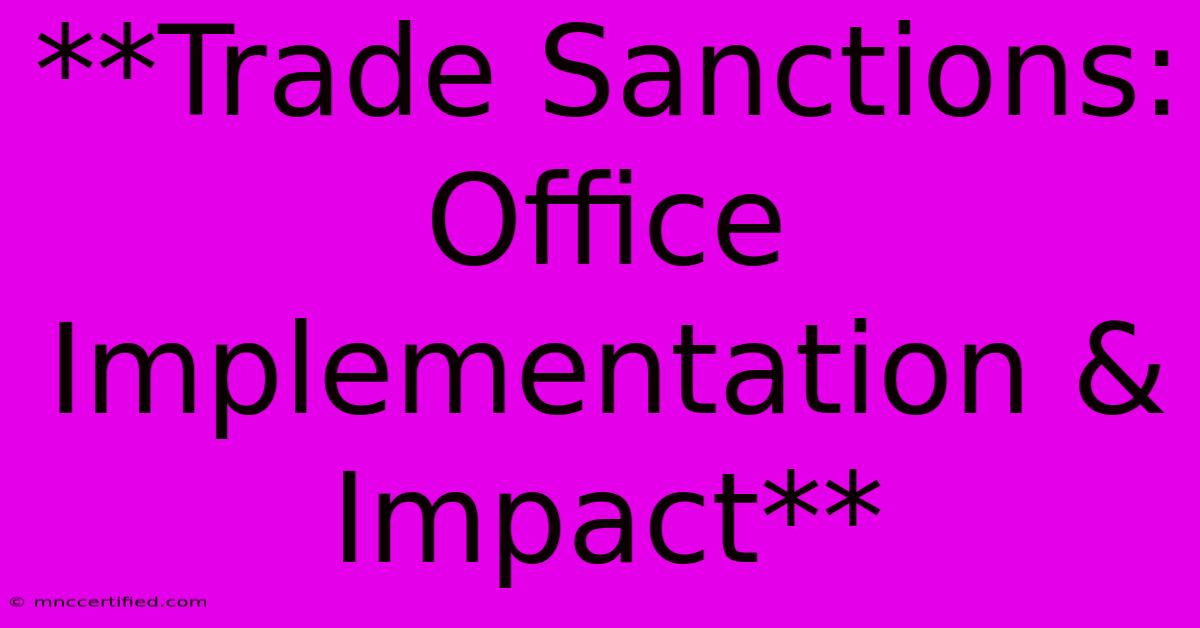**Trade Sanctions: Office Implementation & Impact**

Table of Contents
Trade Sanctions: Office Implementation & Impact
Trade sanctions are a powerful tool used by governments to exert pressure on other countries. They can take many forms, from restrictions on imports and exports to financial penalties. While the ultimate goal of sanctions is often to change the behavior of the target country, the implementation and impact of sanctions can be complex and far-reaching, affecting businesses, individuals, and the global economy.
Understanding Trade Sanctions
Before delving into office implementation and impact, let's clarify what trade sanctions are and how they work.
Definition: Trade sanctions are a set of restrictions or penalties imposed by one or more countries on another country, typically as a form of political or economic pressure. These restrictions can target specific goods, services, individuals, or even entire sectors.
Objectives: Sanctions are often imposed to achieve various objectives, including:
- Changing a country's behavior: Sanctions can be used to deter a country from pursuing specific actions, such as developing weapons of mass destruction or engaging in human rights violations.
- Promoting democracy and human rights: Sanctions can be employed to pressure governments to improve their human rights record or transition to a more democratic system.
- Protecting national security: Sanctions can be used to restrict access to technology or resources that could pose a threat to a country's security.
- Punishing wrongdoing: Sanctions can be used as a form of punishment for a country's actions, such as supporting terrorism or violating international agreements.
The Role of the Office in Implementing Trade Sanctions
Implementing trade sanctions requires a coordinated effort across government departments, including the office of the president, the department of treasury, and the department of commerce. Here's how each office plays a crucial role:
Office of the President: The president typically initiates sanctions by signing executive orders or proclamations. These orders outline the specific sanctions being imposed, the target country or individuals, and the legal basis for the action.
Department of Treasury: The Treasury Department is responsible for administering and enforcing sanctions. This includes:
- Identifying individuals and entities subject to sanctions: The Treasury Department uses various intelligence sources to compile lists of individuals and entities that are subject to sanctions.
- Freezing assets: Sanctions often involve freezing the assets of targeted individuals or entities, preventing them from using their money or property.
- Imposing financial penalties: The Treasury Department can impose fines on individuals and businesses that violate sanctions.
Department of Commerce: The Department of Commerce is responsible for administering export controls, which can be used to restrict the sale of certain goods and technologies to sanctioned countries. This includes:
- Issuing licenses: The Department of Commerce issues licenses for the export of goods and technologies that are subject to export controls.
- Enforcing export control laws: The department investigates and prosecutes companies and individuals that violate export control laws.
Impact of Trade Sanctions on Businesses and Individuals
The impact of trade sanctions can be significant, affecting both businesses and individuals.
Businesses:
- Loss of revenue: Businesses may lose revenue if they are prohibited from doing business with sanctioned countries or individuals.
- Increased costs: Companies may face higher costs if they need to find alternative suppliers or routes to market.
- Reduced investment: Sanctions can make it more difficult for companies to invest in sanctioned countries.
- Legal risks: Businesses that violate sanctions can face significant fines or even criminal prosecution.
Individuals:
- Reduced access to goods and services: Sanctions can limit individuals' access to essential goods and services, such as food, medicine, and fuel.
- Financial hardship: Individuals may experience financial hardship if their assets are frozen or if they are unable to access essential services.
- Limited travel: Sanctions can make it difficult for individuals to travel to or from sanctioned countries.
Impact of Trade Sanctions on the Global Economy
Trade sanctions can have significant ripple effects on the global economy. They can:
- Disrupt global trade: Sanctions can disrupt supply chains and lead to higher prices for goods and services.
- Damage diplomatic relations: Sanctions can strain diplomatic relations between countries and make it harder to resolve disputes.
- Create unintended consequences: Sanctions can have unintended consequences, such as harming innocent civilians or bolstering black markets.
Conclusion
Trade sanctions are a complex and powerful tool that can be used to achieve various objectives. However, it's crucial to consider the wide-ranging impacts on businesses, individuals, and the global economy. Understanding the process of implementation, from the office of the president to the specific agencies responsible, is essential for navigating the intricacies of sanctions and their consequences.

Thank you for visiting our website wich cover about **Trade Sanctions: Office Implementation & Impact**. We hope the information provided has been useful to you. Feel free to contact us if you have any questions or need further assistance. See you next time and dont miss to bookmark.
Featured Posts
-
Southern Owners Insurance Company Address
Nov 07, 2024
-
Rice Votes Democracy In Action On Election Day
Nov 07, 2024
-
Is Bone Marrow Biopsy Covered By Insurance
Nov 07, 2024
-
Trump Mentions Space X Starlink Starship
Nov 07, 2024
-
Live Stream Warriors Vs Celtics Free And Paid Options
Nov 07, 2024